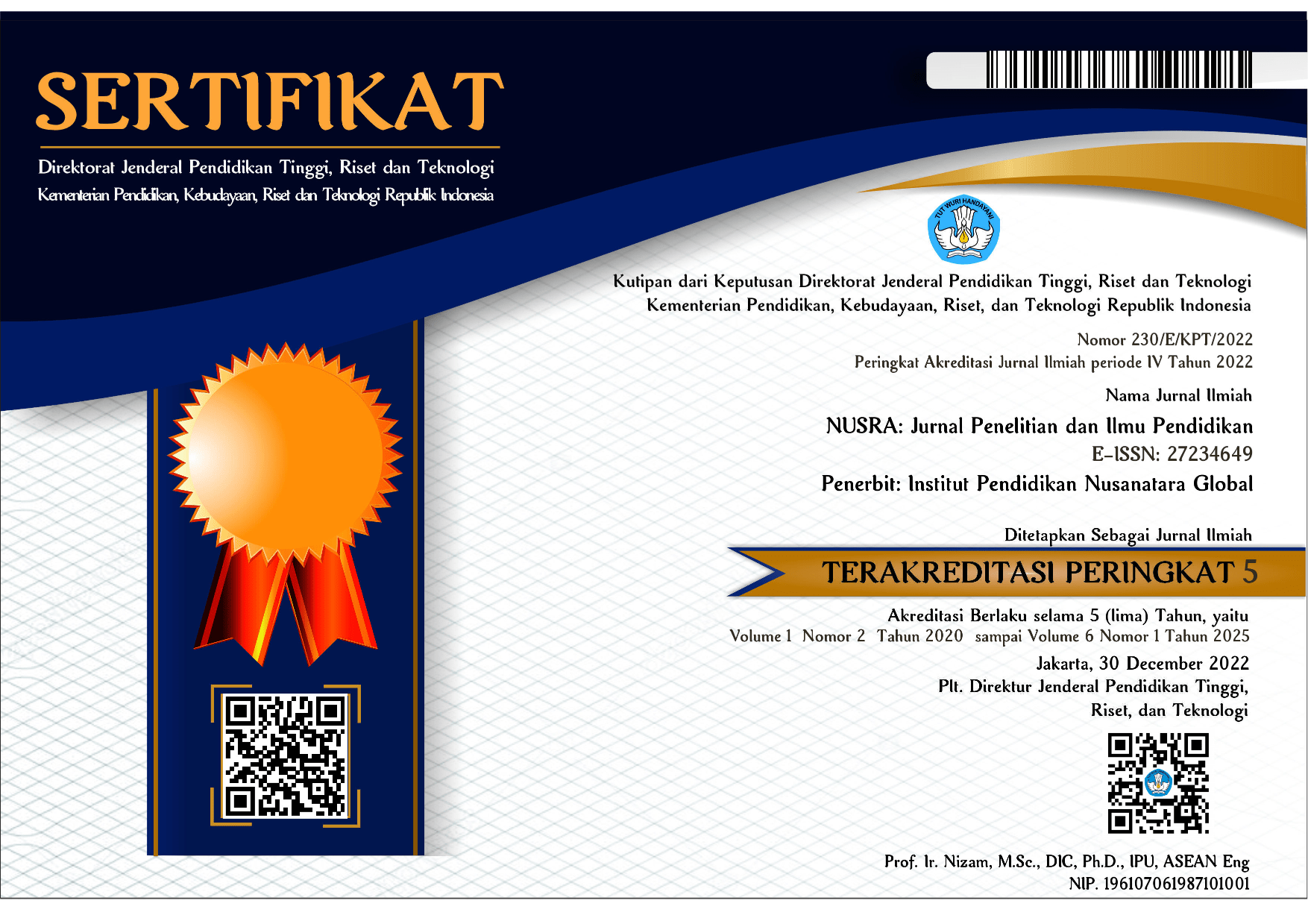Hypothetical Learning Trajectory Based on Ethnomathematics
DOI:
https://doi.org/10.55681/nusra.v5i1.2230Keywords:
Hypothetical Learning Trajectory, EthnomathematicsAbstract
Ethnomathematics is the study of the relationship between mathematics and culture. The culture in question is related to the habits of human behavior in their environment. It is intended that through ethnomathematics, students can better understand mathematical concepts and their culture so as to create meaningful learning. It is important for teachers to develop a mathematics learning model that is meaningful to students from the aspects of content and process. One of the efforts that can be made is to design an ethnomathematics-based Hypothetical Learning Trajectory (HLT) in mathematics learning. The method used in writing this article is literature review. Based on supporting theories, it can be concluded that HLT is a learning design that includes student learning activities based on initial understanding abilities and student characteristics to achieve higher understanding abilities. HLT consists of three components, namely learning objectives, learning activities and learning process hypothesis. HLT in material form is in the form of context and content related to culture-based environment. Developing ethnomathematics-based HLT means using cultural values contextually by considering learning obstacles, material linkages, learning stages that are in accordance with students' thinking abilities, methods used by students and the carrying capacity of learning.
Downloads
References
Ambrosio, U. D.’. (n.d.). Ethnomathematics and its Place in the History and Pedagogy of Mathematics.
Blegur, J., Tlonaen, Z. A., Lumba, A. J. F., & Leko, J. J. (2021). The Importance of Self-Esteem to Students Learning Responsibilities and Group Learning Commitment of Physical Education Students. In Journal of Education, Teaching, and Learning (Vol. 6).
D’Ambrosio, U. 2006. Preface. Prosiding, International Congress of Mathematics Education Copenhagen. Pisa: University of Pisa.
Fajaruddin Atsnan, M. (2016). Keterlaksanaan Learning Trajectory pada Pembelajaran Matematika. LENTERA Jurnal Ilmiah Kependidikan. 11(1), 57–63.
Ferrini-Mundy, J. (n.d.). Principles and Standards for School Mathematics: A Guide for Mathematicians. In NOTICES OF THE AMS (Vol. 47, Issue 8). http://www.nctm.org/
Hardiani, N., & Putrawangsa, S. (2019). Etnomatematika: Tradisi Pengukuran Masyarakat Suku Sasak dan Potensi Pengintegrasiannya dalam Pembelajaran Matematika. AKSIOMA: Jurnal Program Studi Pendidikan Matematika, 8(1). https://doi.org/10.24127/ajpm.v8i1.1814
Ivana Hendrik, A., Ekowati, C. K., & Samo, D. D. (2020). Kajian Hypothetical Learning Trajectories dalam Pembelajaran Matematika di Tingkat SMP. In Jurnal Matematika dan Pendidikan Matematika (Vol. 1, Issue 1).
Lisna Handayani, N. (n.d.). Pembelajaran Learning Trajectory Berbasis Ethnomathematics.
Okta Marinka, D., Febriani, P., & nyoman Wirne, I. (2018). Efektifitas Etnomatematika dalam Meningkatkan Kemampuan Pemahaman Matematika Siswa. In Jurnal Pendidikan Matematika Raflesia (Vol. 03, Issue 02). https://ejournal.unib.ac.id/index.php/jpmr
Prodi Matematika STAIN Palopo, D. (2013). Belajar Bermakna Ausubel. Oleh: Nur Rahmah. In Belajar Bermakna Ausubel Al-Khwarizmi: Vol. I.
Rakhmawati, R., Raden, M. I., & Lampung, I. (2016). Aktivitas Matematika Berbasis Budaya pada Masyarakat Lampung. In Jurnal Pendidikan Matematika (Vol. 7, Issue 2).
Rezky, R., Negeri, S., Buton Selatan, S., & Penulis, K. (2019). Hypothetical Learning Trajectory (HLT) dalam Perspektif Psikologi Belajar Matematika. 18(1), 762–769. http://jurnal.iain-bone.ac.id/index.php/ekspose
Simon, M. (2014). Hypothetical Learning Trajectories in Mathematics Education. In S. Lerman (Ed.), Encyclopedia of Mathematics Education (pp. 272-275). Springer Netherlands
Downloads
Published
How to Cite
Issue
Section
License
Copyright (c) 2024 Ferry Indra Sakti Sinaga

This work is licensed under a Creative Commons Attribution-ShareAlike 4.0 International License.














